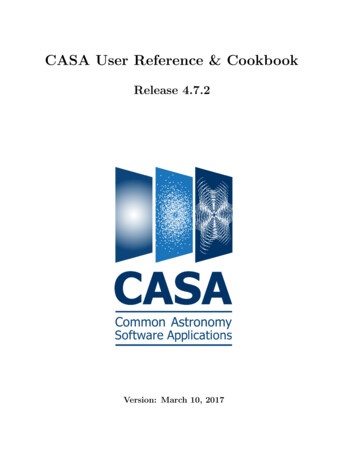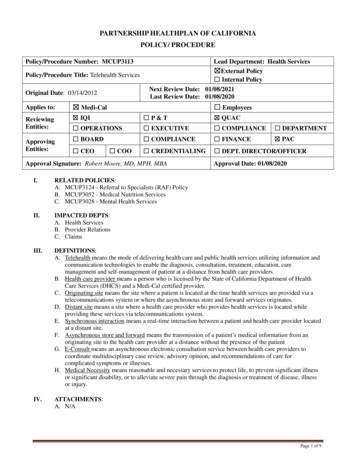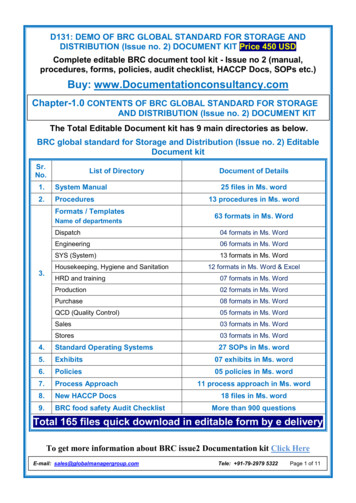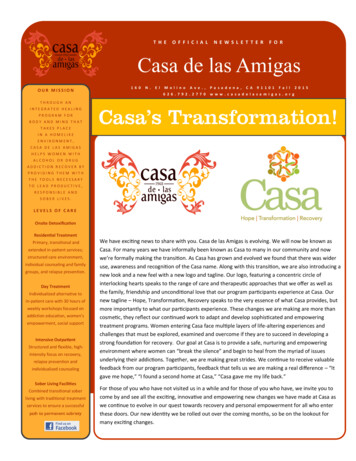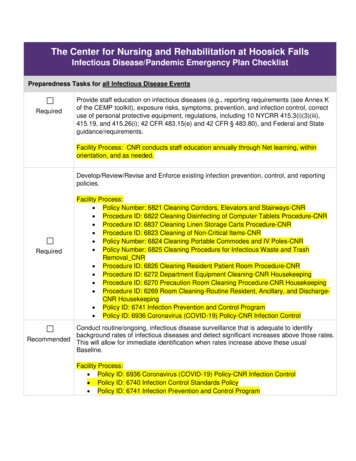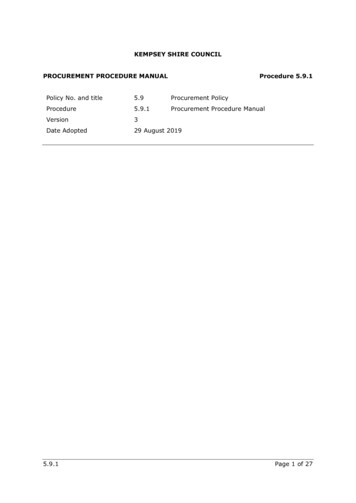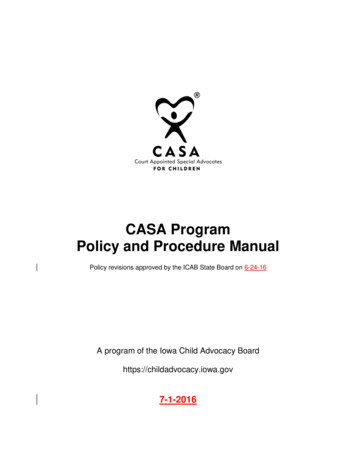
Transcription
CASA ProgramPolicy and Procedure ManualPolicy revisions approved by the ICAB State Board on 6-24-16A program of the Iowa Child Advocacy Boardhttps://childadvocacy.iowa.gov7-1-2016
SECTION 1: PROGRAM OVERVIEW . 1A.Mission and Purpose of Iowa CASA Program . 1B.Program Governance . 1C.State Affiliation . 5D.National Affiliation. 5SECTION 2: ETHICAL CONDUCT . 6A.Conduct: . 6B.Confidentiality Policy: . 6C.Knowledge and Understanding:.10SECTION 3: PUBLIC RELATIONS .10A.Public Relations .10SECTION 4: DISPROPORTIONALITY .12A.Increase awareness of the issue .12B.Engaging in Community Partnerships .12C.Recruitment .12SECTION 5: CASA MANAGEMENT .13A.Recruitment .13B.Screening of Applicants .13C.Pre-Service Training .16D.Swearing-In Ceremony.18E.CASA Supervision and Responsibilities .19F.Advocate Roles and Responsibilities .24G.Release of a CASA appointment .28H.Advocate Retention and Recognition .28I.Dismissal of an Advocate or Coach .29
J.Program Exit by an Advocate or Coach.29SECTION 6: RECORD KEEPING.29A.Case Record Management .29B.CASA Record Management .31C.Statistical Data .33SECTION 7: FRIENDS OF IOWA CASA & FCRB .34A.Friends Account .34B.Fundraising, Donations and Grants .34C.Audit .34ResourcesStaff can access the resources referenced in this manual on the Iowa Child Advocacy Boardwebsite. hp?page PoliciesandProceduresStaff1. Program Description and Criteria2. Friend of Court Model3. Guardian Ad Litem Model4. ICAB Social Media Policy5. Recruitment Plan Template6. Cover Letter – Applicant7. Application8. Iowa CASA Fact Sheet9. CASA Role – Job Description10. Foundations Training Schedule11. Personal Inquiry Letter12. Personal Inquiry Questionnaire13. CASA Interview Form13b. Advocate Skills and Perspective Assessment14. DHS Child Abuse Check15. ICAB Consent Form16. Substitute W-917. Travel Claim18. Iowa Code for Oath19. Confidentiality Oath20. Request for CASA Assignment21. a. Order for CASA-GAL Assignment21. b. Order for Court Appointed Special Advocate Assignment22. a. Order for CASA-GAL AppointmentiiRevised: 2016-7-1
22. b. Order for CASA Appointment23. a. Notice of Acceptance (Coach Model)23. b. Notice of Acceptance (Coordinator supervision)24. Announcing CASA to Interested Parties25. Parent Information Sheet and CASA and You26. ICAB Office Protocol27. Case Summary Action Plan28. CASA Case Progress Review Form29. Tracking Form – CASA Training30. Exception – In-Person Contact Form31. Health Related Consent Form32. Non-Health Related Consent Form33. a. CASA Report Template33. b. Template with Guide34. CASA Program Exit Survey35. Exception – Multiple Case Form36. Transportation Policy37. Transportation Consent38. a. Order to Release CASA Advocate38. b. Order to Release CASA Advocate and Program39. Accounting Form for Friends40. Ethic Form for Friends41. Confidentiality Agreement for CASA Assistant or Volunteer Office Staff42. P&P Letter of Acknowledgement for Advocates43. Photo Release Form44. a. Monthly Advocate Update Template (word)44. b. Monthly Advocate Update Template (pdf)45. Revocation of Order for Court Appointed Special Advocate Assignment46. Coach Progress Review Form47. Case Closure Survey - Advocate48. Case Closure Survey - Interested Parties49. Pledge - CASA Advocate50. Pledge - CASA Coach51. Case Closure52. Advocate Training Needs Assessment New53. Informal Advocate Training form NewiiiRevised: 2016-7-1
Section 1: Program OverviewThis section provides an overview of the Iowa CASA Program as it relates to the mission,purpose, governance, and affiliations.A. Mission and Purpose of Iowa CASA Program1. The Iowa Court Appointed Special Advocate (CASA) program commissions trained andqualified community advocates to serve as an effective voice in court for abused andneglected children, strengthening efforts to ensure that each child is living in a safe,permanent and nurturing home.2. The Iowa CASA program recognizes the importance of advocating for the best interestsof abused and neglected children in the court system. The goal of the Iowa CASAprogram is continued development and expansion of an active CASA program(advocates recruited, screened, trained, and assigned to cases, with supervision andprogram assistance available) in all of Iowa. The Iowa CASA Program has been grantedthe legal authority to operate in all of Iowa’s 99 counties.3. The child population served by the Iowa CASA program is clearly defined as childrenfrom birth to 18 years of age who have been adjudicated a child in need of assistance(CINA). The Iowa CASA program accepts court-referred cases that meet the definition ofchild in need of assistance (CINA), per Iowa Code Section 232.2. The CASA programserves any child for whom the court appoints a court appointed special advocate. Thecourt may appoint an advocate to represent the interests of a child in any judicialproceeding to which the child is a party or is called as a witness or relating to anydispositional order involving the child resulting from the proceeding. The court mayappoint an advocate in a delinquency, child in need of assistance or family in need ofassistance proceeding. If the plan for the child’s transition from foster care to adulthoodidentifies services or other support needed to assist the child when the child becomes anadult and the court deems it beneficial to the child, the court may authorize the courtappointed special advocate to continue a relationship with and provide advice to thechild for a period of time beyond the child’s eighteen birthday.4. The Iowa CASA program solely provides trained and qualified community individuals toadvocate for the best interests of children who come before the court as a direct result ofabuse or neglect as defined by the state child welfare laws. All Iowa CASAs must submitan application, provide three personal references, complete a personal interview withCASA staff, pass background checks, complete thirty (30) hours of pre-service trainingand take an Oath of Confidentiality with a Judge before being appointed to a case.B. Program Governance1. Iowa Child Advocacy Boarda. The board is a nine member volunteer board appointed by the Governor. The Boardprovides oversight to both the Court Appointed Special Advocate program and theFoster Care Review Board program. The Iowa Child Advocacy Board Administratoris hired by the State Board and reports directly to the Board regarding agencydecisions and governance. The Board works to ensure that Iowa’s abused andneglected children and all foster children are well cared for and that the systemdesigned to meet their needs is doing so in the most effective manner possible. Onemethod of tracking data for the children served by the CASA program is the IowaChild Advocacy Board’s web-based data system, Iowa CAB Online (ICO).1Revised: 2016-7-1
b. The Board is responsible for making recommendations to the Governor, Legislature,Supreme Court, Chief Judge of each judicial district, Department of Human Services(DHS), and child-placing agencies on ways to improve the delivery of foster careservices. Members also submit recommendations on how to remove barriers thatprevent the delivery of top-quality foster care, as well as services to abused andneglected children.Governor of IowaIowa Child AdvocacyBoardICABAdministratorICABDeputy AdministratorLocal Field OfficesState Office Staff(Coordinators vocatesCASAAdvocates2. Program Administrator’s responsibilities, operating out of the State Office, include thefollowing for the CASA Program:a. Regularly collect, organize and report budgetary, programmatic and systemicinformation and recommendations to the State Board to assist it to carry out itsstatutory duties, which include the establishment and administration of Iowa’s CASAprogram and the delivery of reports and recommendations to the Governor, GeneralAssembly, Court and others. Assist the Board as directed in all matters related to itsmeetings, deliberations and decisions.b. In consultation with ICAB staff, stakeholders and organizations involved in the childwelfare system, develop operational plans to implement the strategies established bythe Board.c. Review or modify changes in operations, staffing assignments, informationmanagement system functions, CASA program policies and related matters asneeded or as requested or proposed by local program staff, state office managementteam or CASA program’s steering committee; establish and monitor functional workactivities and organizational relationships to meet statutory and program fundingrequirements and achieve ICAB goals and objectives.d. Provide direct supervision to CASA staff in coordination with the DeputyAdministrator. In cooperation with the Department of Inspections and Appeals,approve and assure appropriate personnel actions for all ICAB employees related toselection, performance, leaves of absence, grievances, work schedules andassignments and disciplinary procedures; and, administer personnel and relatedpolicies and procedures.2Revised: 2016-7-1
e. Provide policies, direction and consultation to Coordinators to assure theirappropriate recruitment, screening, training, supervision and support of all ICABprogram advocates. Accept or reject requests for policy exceptions to advocateeligibility conditions based on background check findings. Exercise authority tointervene and resolve ICAB staff disputes, disciplinary actions or other concerns withadvocates as needed to assure staff and advocate compliance with ICAB programpolicies.f. Develop and maintain effective working relationships and carry out planning andadvocacy activities with a broad spectrum of key officials and organizations togenerate executive, legislative and related support for budget requests andmanagement decisions on ICAB priorities/goals. Represent ICAB on statutorycommittees and other national, state, local child welfare initiatives and partnerships.Identify and carry out initiatives that promote ICAB programs and their volunteeropportunities to targeted audiences and the general public.g. Prepare, or approve, and provide required reports and responses to requests forinformation from the Governor’s Office, General Assembly, Court, funding sources,ICAB program interested parties and others.h. Seeks grants as deemed necessary and appropriate to assist in growth andprogramming of CASA in the state of Iowa.3. Deputy Administrator’s responsibilities, operating out of the State Office, include thefollowing for the CASA program:a. Provide direct supervision to CASA staff in coordination with the Administrator.Assure appropriate personnel actions for CASA employees related to performance,leaves of absence, grievances, work schedules and assignments and disciplinaryprocedures; and, administer personnel and related policies and procedures. For newhires, arrange for initial training and mentoring, and create performance plan. Initiateand complete timely performance evaluations for designated staff.b. In consultation with Administrator and ICAB staff, direct and oversee thedevelopment of specific plans to carry out program operations.c. Recommend and assist the implementation of approved changes in operations,staffing assignments, information management system functions, and other CASAprogram policies and related matters as needed or as requested or proposed by fieldstaff, state office management team or steering committee.d. Regularly collect, organize and report statistical information for the CASA program.Analyze information and seek to maximize the effectiveness of the programs for bothindividual staff contributors and the agency as a whole. Provide consultation andsupport for field staff in the execution of their assigned duties.e. Provide policies, direction and consultation to local program coordinators to assuretheir appropriate recruitment, screening, training, supervision and support of all ICABprogram advocates. Exercise management authority to intervene and resolve ICABstaff disputes, disciplinary actions or other concerns with advocates as needed toassure staff and advocate compliance with ICAB program policies.f. Develop and maintain effective working relationships and carry out planning andadvocacy activities with a broad spectrum of key officials to support managementdecisions on ICAB priorities/goals.g. Organize the NCASAA annual report for the agency by coordinating the datacollection of the Coordinators and providing state-level data within established timeframes.3Revised: 2016-7-1
4. Program Coordinator’s responsibilities, operating out of a specific cluster of counties, areas follows:a. Meet with Judges, DHS, county attorneys, attorneys and service providers toeducate them about the CASA program. Maintain ongoing contact with theseprofessionals to enhance your working relationship and problem solve with thoseindividuals and agencies as needed. Seek and receive their feedback regardingprogram functionality and their recommendations to further enhance CASA.b. Increase public awareness of the CASA Program through public speaking tocommunity groups and organizations.c. Handle local media responsibilities as needed for recruitment and/or publicawareness about the program.d. CASA Management as outlined in Section 5 of this manual.e. Record keeping as outlined in Section 6 of this manual.f. Perform other responsibilities to include: maintain contact with Administrator andDeputy Administrator for program updates; attend program staff meetings asscheduled; other duties as determined by the Administrator to be in the best interestof the local program.5. Role of a CASA Coacha. Provide support and coaching for 5-10 advocates in their work with children whichincludes but is not limited to:i.Case assignments and verification of an advocate’s acceptance of the case.ii.Review initial case file information with the advocate and assist in thedevelopment of the advocate’s action plan for the case.iii.Track court hearings and confirm the advocate’s attendance.iv.Maintain monthly contact with advocates to obtain case updates and addressissues as needed.v.Remind advocates to keep up-to-date contact log entries, training hours, andtimely submission of hours/miles and court reports.vi.Review and edit advocate’s reports. Submit reports to the CASA Coordinatorfor final review and distribution prior to each court hearing.vii.Be available to advocates for assistance with cases and to attend courthearings with an advocate or on his/her behalf if needed. If unavailable,schedule coverage by contacting the CASA Coordinator.b. Maintain communication with the CASA Coordinator a minimum of once a month todiscuss cases, progress, issues or critical events that occur in a case.c. Professional Developmenti.Be knowledgeable of the CASA Policies and Procedures for the program,advocates and coaches.ii.Attend required training and educational opportunities to enhance skills.6. Role of the CASAUpon completion of pre-service training requirements, a CASA will be assigned to acase and fulfill the following responsibilities:a. Investigation: The CASA carries out an objective examination of the situation,including relevant history, environment, relationships, and needs of the child.b. Facilitation: The CASA identifies resources and services for the child and facilitates acollaborative relationship between all parties involved in the case, helping to create asituation in which the child’s needs can be met.c. Advocacy: The CASA speaks up for the child by making recommendations at eachcourt hearing regarding the child’s best interests.4Revised: 2016-7-1
d. Monitoring: The CASA monitors whether the orders of the court and the plans of thechild protective services agency are carried out, and reports to the court orcollaborates with the child protective services agency when any of the parties do notfollow those orders and plans.C. State Affiliation1. The Iowa CASA programs comply with all state law, regulations and administrative andcourt rules.2. The Iowa CASA programs take advantage of services available from the state officewhich may include:a. Technical assistanceb. Resource materialsc. All-staff meetingsd. Training opportunitiese. Web resourcesD. National Affiliation1. The CASA Program takes advantage of the services available from National CASAwhich include:a. Technical assistanceb. Resource materialsc. National conferenced. Training opportunities2. When using National CASA trademarks including taglines, slogans, and logos, theCASA program adheres to National CASA graphic standards.3. The CASA program uses the name CASA, GAL or identifies itself as a member of theNational CASA Association on all promotional, public relations and recruitmentmaterials.4. The Iowa CASA Program and its individual Program sites are members of the NationalCASA Association, and as such, are bound by the following standards:Standard 1:Standard 2:Standard 3:Standard 4:Standard 5:Standard 6:Standard 7:Standard 8:Standard 9:Standard 10:Standard 11:Standard 12:Standard 13:Standard 14:Program Mission and PurposeEthical ConductInclusiveness and DiversityDisproportionalityProgram GovernanceHuman Resources ManagementVolunteer ManagementPublic RelationsPlanning and EvaluationFinancial, Facility and Risk ManagementRecord KeepingNational AffiliationState AffiliationProgram Development, Implementation and ExpansionA complete copy of the National CASA Association Local Standards may be obtained bycontacting the local CASA office in your area or accessing it fromwww.casaforchildren.org .5Revised: 2016-7-1
Section 2: Ethical ConductThis Code of Ethics provides advocates and the staff of the lowa CASA program with guidelinesfor professional behavior and ethical conduct. Advocates, CASA coaches and staff shall abideby this Code of Ethics and all laws and regulations governing their activities.A. Conduct:1. Employees, CASA coaches and advocates will uphold the credibility and dignity of theCASA concept by conducting all business in an honest, fair, professional and humanemanner.2. Employees, CASA Coaches and Advocates will refrain from the use of alcohol orsubstances while conducting CASA-related work.3. Employees, CASA coaches and advocates will use their authority appropriately.Employees, CASA coaches and advocates will not condone any illegal action orunethical practice related to the program or community or participate in harassingbehavior towards children, their families or other case parties. Employees, advocatesand governing body members must immediately notify the CASA program of anycriminal charges filed against them.4. Employees, CASA coaches and advocates will uphold the CASA Program through theiractions. Those involved with CASA will appropriately use good/materials and will makeevery effort to secure confidential information they obtain through their position withCASA.5. Employees, CASA coaches and advocates will avoid any action that could adverselyaffect the confidence of the public in the integrity of the program.6. Employees, CASA coaches and advocates shall not engage in any activity that mightcreate a conflict of interest for the CASA program or for themselves individually.a. If a possible conflict of interest arises at the management level, the Administratorshall report to the State Board in writing that the conflict of interest was disclosed andthat the interested party was not present and did not participate in discussion,deliberation or decision on the matter.b. If any party does not disclose a potential conflict of interest prior to becominginvolved in a transaction or decision effected by the conflict, appropriate discipline ordismissal will be implemented.c. See Section 5: CASA Management for conflict of interest policy regarding advocates.7. The CASA program will serve and respond to requests without bias because of race,religion, sex, gender, national origin or handicap.B. Confidentiality Policy:1. Case file informationa. The CASA program staff, coaches and advocates will respect the right to privacy ofall individuals and will keep information about CASA cases confidential. Staff andadvocates shall adhere to the confidentiality of records provisions pursuant to IowaCode §217.30. Violation of this section shall constitute a serious misdemeanor.6Revised: 2016-7-1
b. Pursuant to Iowa Code §235A.15 and §235A.17, staff, coaches and advocates shallmaintain all information received from the child abuse registry or assessment reportas confidential and shall not disseminate such information except when the redissemination is in connection with official duties, and the person receiving theinformation would have independent access to the same information under§235A.15.i. To obtain a copy of the Child Protective Services Assessment Summary,complete the DHS request form. The form can be is/PolicyManualPages/Manual Documents/Forms/470-0643.pdfii. Fax the form to the Child Abuse Registry2. Gathering case informationa. Unless otherwise enlarged or circumscribed by a court or juvenile court havingjurisdiction over the child or by operation of law, the duties of a guardian ad litem,and thereby court appointed special advocate, with respect to a child pursuant toIowa Code section 232.2(22) “b” shall include the following:i.Conducting in-person interviews with the child, if the child's age is appropriatefor the interview, and interviewing each parent, guardian, or other personhaving custody of the child, if authorized by counsel.ii.Conducting interviews with the child, if the child's age is appropriate for theinterview, prior to any court-ordered hearing.iii.Visiting the home, residence, or both home and residence of the child andany prospective home or residence of the child, including each timeplacement is changed.iv.Interviewing any person providing medical, mental health, social, educational,or other services to the child, before any hearing referred to in subparagraph(2).v.Obtaining firsthand knowledge, if possible, of the facts, circumstances, andparties involved in the matter in which the person is appointed guardian adlitem.vi.Attending any hearings in the matter in which the person is appointed as theguardian ad litem.vii.If the child is required to have a transition plan developed in accordance withthe child's case permanency plan and subject to review and approval of atransition committee under section 235.7, assisting the transition committeein development of the transition plan.b. Upon presentation of this Order to any agency, hospital, organization, school, personor office, including the Clerk of Court, Department of Human Services, Juvenile CourtServices and/or agencies providing services to families and children, public andprivate health care facilities, medical and mental health professionals includingdoctors, nurses, psychiatrists, counselors and staff and law enforcement agencies,the CASA Advocate and program staff are hereby authorized to interview anyrelevant person and inspect and copy any records relevant to the proceedings,including protected health information, if not prohibited by federal law. The CASAAdvocate and program staff may interview, and are hereby authorized to receiveverbal and written disclosure from any person providing medical, mental health,social, educational, or other services to the child(ren), relating to the above namedchild(ren) without consent of the child(ren) or parents of the child(ren) pursuant toIowa Code Sections 232.147(3), 237.21 and 235A.15(2)(d). The CASA and programstaff may attend any departmental staff meeting, case conference, or meeting with7Revised: 2016-7-1
medical or mental health providers, service providers, organizations, or educationalinstitutions regarding the child(ren), if deemed necessary by the CASA or programstaff; and pursuant to 237.21(2)(a), a court appointed special advocate may attendfamily team decision-making meetings or youth transition decision-making meetingsupon request by the family or child and disclose case-related observations andrecommendations relating to a child or a child’s family while attending the meetings;3. Disclosing Informationa. Iowa Code §237.21 (2)(a). A court appointed special advocate may attend familyteam decision-making meetings or youth transition decision-making meetings uponrequest by the family or child and disclose case-related observations andrecommendations relating to a child or a child’s family while attending the meetings.b. Iowa Code §237.21 (2)(b). A court appointed special advocate may disclose caserelated observations and recommendations to the agency assigned by the court tosupervise the case, to the county attorney, or to the child’s legal representative orguardian ad litem.c. Agency in “a.” refers to the Department of Human Service (DHS) or Juvenile CourtServices (JCS).d. When CASA staff, advocates and/or coaches are included in group emails with casespecific information, subsection (2)(b) prohibits the staff, advocate or coach fromreplying to all recipients in the group email. Disclosing case-related observations andrecommendations can only be made to DHS/JCS, the county attorney or to thechild’s legal representative or guardian ad litem.4. CASA report disseminationa. Reports prepared by advocates for submission will be disseminated by the localCASA program to the court and to each of the parties to the proceedings (Iowa Code232.89) prior to each scheduled court hearing:i.Only to anyone who is required to receive notice and be present at a hearing(DHS, juvenile court officer, county attorney, child’s parent, child’s guardian,child’s legal custodian, child’s attorney or guardian ad litem, intervener,parent's attorney, intervener’s attorney), according to local protocol or ascourt orderedii.If the permanency goal is adoption, then in accordance with Iowa Code§232.88, reasonable notice for any hearing shall be provided to the agency,facility, institution, or person, including a foster parent, relative, or otherindividual providing pre-adoptive care, with whom a child has been placed. Inthese cases, CASA reports are disseminated to the foster parent, relative orindividual with whom the child is placed for pre-adoptive care.iii.CASA reports are provided to the local Foster Care Review Board inaccordance with Iowa Code §237.20 1a(1).iv.No other dissemination of information by the advocate or CASA program ispermitted.b. If a person is represented by counsel, providing the CASA report to that person’sattorney is the same as providing it to the person and the parent’s attorney should besharing the report with their client.c. Intervener as referenced in “a.i.” is any agency, facility, institution, or personincluding a foster parent or individual providing pre-adop
This section provides an overview of the Iowa CASA Program as it relates to the mission, purpose, governance, and affiliations. A. Mission and Purpose of Iowa CASA Program 1. The Iowa Court Appointed Special Advocate (CASA) program commissions trained and qualified community advocates to serve as an effective voice in court for abused and




